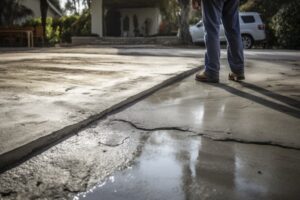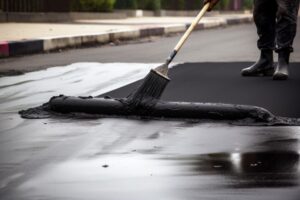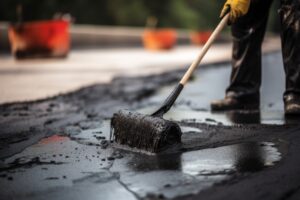Understanding the Importance of Regular Maintenance
Regular maintenance is crucial for keeping your asphalt driveway in optimal condition. Neglecting routine maintenance can lead to a host of issues, including cracks, potholes, and deterioration of the surface. By regularly inspecting and maintaining your driveway, you can prevent costly repairs and extend its lifespan.
One of the main reasons for regular maintenance is to identify and address any potential issues before they worsen. Through routine inspections, you can catch small cracks or signs of wear and tear early on, preventing them from developing into major problems. Regular maintenance also allows you to address drainage issues, which can cause water damage and further deterioration of the asphalt surface. By prioritizing regular maintenance, you can ensure that your driveway remains functional, safe, and aesthetically pleasing for years to come.
Identifying Common Issues with Asphalt Driveways
Asphalt driveways are a popular choice for homeowners due to their durability and affordability. However, like any other material, they are not immune to common issues that can arise over time. One of the most common issues with asphalt driveways is the presence of cracks. These cracks can occur due to a variety of factors, such as extreme temperatures, heavy vehicle traffic, or improper installation. It is important to identify and address these cracks early on to prevent further damage and deterioration of the driveway.
Another common issue with asphalt driveways is the formation of potholes. Potholes are not only unsightly but can also pose a safety hazard for pedestrians and vehicles. They are usually caused by the expansion and contraction of water beneath the surface, which weakens the asphalt and leads to its eventual collapse. Identifying the presence of potholes and addressing them promptly is crucial in order to maintain the integrity and functionality of the driveway.
• Cracks are a common issue with asphalt driveways and can occur due to extreme temperatures, heavy vehicle traffic, or improper installation.
• Identifying and addressing cracks early on is important to prevent further damage and deterioration of the driveway.
• Potholes are another common issue with asphalt driveways that can be unsightly and pose safety hazards.
• Potholes are usually caused by the expansion and contraction of water beneath the surface, weakening the asphalt.
• Promptly identifying and addressing potholes is crucial for maintaining the integrity and functionality of the driveway.
Cleaning Techniques to Keep Your Driveway Looking Fresh
Cleaning Techniques to Keep Your Driveway Looking Fresh:
Regular cleaning is crucial for maintaining the appearance and functionality of your asphalt driveway. Over time, dirt, debris, and stains can accumulate on the surface, making it look dull and unattractive. To keep your driveway looking fresh, start by sweeping away loose dirt and debris using a stiff bristle broom or a leaf blower. This will help prevent these elements from embedding into the surface and causing further damage. Following this, rinse the driveway with a garden hose to remove any remaining dirt, and use a pressure washer for more stubborn stains or grime. Be mindful of the pressure setting, as too much force can lead to surface damage.
In addition to regular cleaning, applying a high-quality driveway cleaner can help remove deep-seated stains and revive the appearance of your asphalt. Choose a cleaner specifically designed for asphalt surfaces and follow the product instructions carefully. Spread the cleaner evenly over the entire area, using a brush or broom to scrub heavily soiled or stained areas. Allow the cleaner to penetrate for the recommended time before rinsing it off thoroughly. By incorporating these cleaning techniques into your driveway maintenance routine, you can effectively keep your asphalt driveway looking fresh and inviting.
Effective Strategies for Preventing Cracks and Potholes
Asphalt driveways are susceptible to various forms of damage, including cracks and potholes. These issues can not only detract from the appearance of your driveway, but they can also pose potential hazards to vehicles and pedestrians. Preventing cracks and potholes requires a proactive approach to regular maintenance and timely repairs.
One effective strategy for preventing cracks is to ensure proper drainage on your driveway. Water pooling on the surface can weaken the asphalt over time, leading to cracks. By implementing a proper drainage system, such as installing a french drain or creating sloping angles, you can divert water away from the driveway and reduce the likelihood of cracks forming. Additionally, regular cleaning and removal of debris can also help prevent cracks as foreign objects can cause stress on the asphalt, leading to damage.
The Role of Proper Drainage in Asphalt Driveway Maintenance
Proper drainage plays a crucial role in maintaining the integrity and longevity of asphalt driveways. When it comes to asphalt, water is one of its biggest enemies. If not properly managed, water can infiltrate the asphalt surface, causing it to weaken, crack, and ultimately deteriorate. This is why having a well-designed and functioning drainage system is essential for preserving the condition of your driveway.
One of the main purposes of a drainage system is to redirect water away from the surface of the driveway. This can be achieved through the use of sloping or grading techniques that ensure water flows away from the driveway and towards appropriate drainage points. Additionally, the installation of gutters, downspouts, and drainage channels can further help to divert water and prevent it from pooling or seeping into the asphalt. By effectively managing water and maintaining proper drainage, you can significantly reduce the risk of damage and prolong the lifespan of your asphalt driveway.
Essential Tools and Equipment for DIY Maintenance
When it comes to maintaining your asphalt driveway, having the right tools and equipment on hand is essential for getting the job done effectively. One of the most important tools you will need is a sturdy, high-quality broom. This will allow you to sweep away any debris or dirt that can accumulate on the surface of your driveway and lead to damage over time. Additionally, a pressure washer can be a valuable asset for deep cleaning your driveway and removing stubborn stains. Make sure to choose a pressure washer with adjustable settings, so you can control the intensity of the water spray and avoid causing any unnecessary damage to your driveway.
Another tool that is often overlooked but can be extremely useful for DIY driveway maintenance is a crack filler. Cracks can develop over time due to weather conditions and regular wear and tear, and if left untreated, they can lead to more serious damage. A crack filler will help seal up any small cracks and prevent them from growing larger or allowing water to seep in. Alongside a crack filler, having a trowel or putty knife will allow you to smooth and level the crack filler once applied, ensuring a seamless finish. These essential tools will enable you to take care of minor repairs and keep your driveway in top condition for years to come.
Choosing the Right Sealant for Long-Lasting Protection
To ensure long-lasting protection for your asphalt driveway, choosing the right sealant is crucial. The type of sealant you select will determine the level of durability, resistance to weather elements, and overall appearance of your driveway. There are various sealant options available, each with its own set of advantages and disadvantages.
One of the most common types of sealants used for asphalt driveways is coal tar. Coal tar sealants provide excellent protection against water, oil, and UV radiation. They have a deep, rich black color that enhances the overall aesthetics of the driveway. However, coal tar sealants do have a relatively short lifespan and can be prone to cracking in colder climates. Another popular option is asphalt emulsion sealants, which are environmentally friendly and offer good resistance to weathering and cracking. They tend to have a lighter gray color compared to coal tar sealants but are generally more flexible and longer-lasting.
Expert Tips for Repairing Small Damages on Your Driveway
When it comes to repairing small damages on your driveway, there are a few expert tips that can help you achieve long-lasting results. First and foremost, it is important to clean the damaged area thoroughly before starting any repair work. Use a stiff brush or a pressure washer to remove any dirt, debris, or loose asphalt particles from the surface. This will ensure better adhesion and a more seamless repair.
Next, you will need to fill in the small cracks or holes in your driveway. One effective technique is to use a cold asphalt patching compound. This ready-to-use material can be applied directly to the damaged area and then compacted with a trowel or a tamper. Make sure to follow the manufacturer’s instructions for proper application and curing time. Alternatively, you can also opt for a liquid crack filler that can be poured into the cracks and then smoothed out with a scraper or squeegee. Whichever method you choose, make sure to apply enough filler to completely cover the damaged area and create a level surface.
Why is regular maintenance important for my driveway?
Regular maintenance helps prevent small damages from turning into major issues. It extends the lifespan of your Asphalt Driveway and keeps it looking fresh.
What are some common issues that can occur with asphalt driveways?
Asphalt Driveway common issues include cracks, potholes, and fading of the asphalt color. These can be caused by weather conditions, heavy vehicles, or improper installation.
How can I clean my driveway to keep it looking fresh?
Regular sweeping and using a pressure washer can help remove dirt and debris. You can also use a mild detergent and scrub brush to remove stains.
What strategies can I use to prevent cracks and potholes on my driveway?
Proper installation, regular sealing, and avoiding heavy vehicles or equipment on the driveway can help prevent cracks and potholes.
How does proper drainage play a role in driveway maintenance?
Proper drainage ensures that water does not accumulate on the driveway, which can cause damage over time. It is important to ensure proper slope and install drainage systems if necessary.
What tools and equipment do I need for DIY driveway maintenance?
Some essential tools include a broom, pressure washer, crack filler, sealant applicator, and a trowel. Depending on the specific repair needs, additional tools may be required.
How do I choose the right sealant for my driveway?
Consider factors such as climate, driveway usage, and the type of asphalt when choosing a sealant. It is recommended to consult with a professional or read product labels for guidance.
Can you provide some expert tips for repairing small damages on my driveway?
Some expert tips include cleaning the damaged area thoroughly, filling cracks with a crack filler, ensuring proper application of sealant, and allowing sufficient drying time before using the driveway again.



